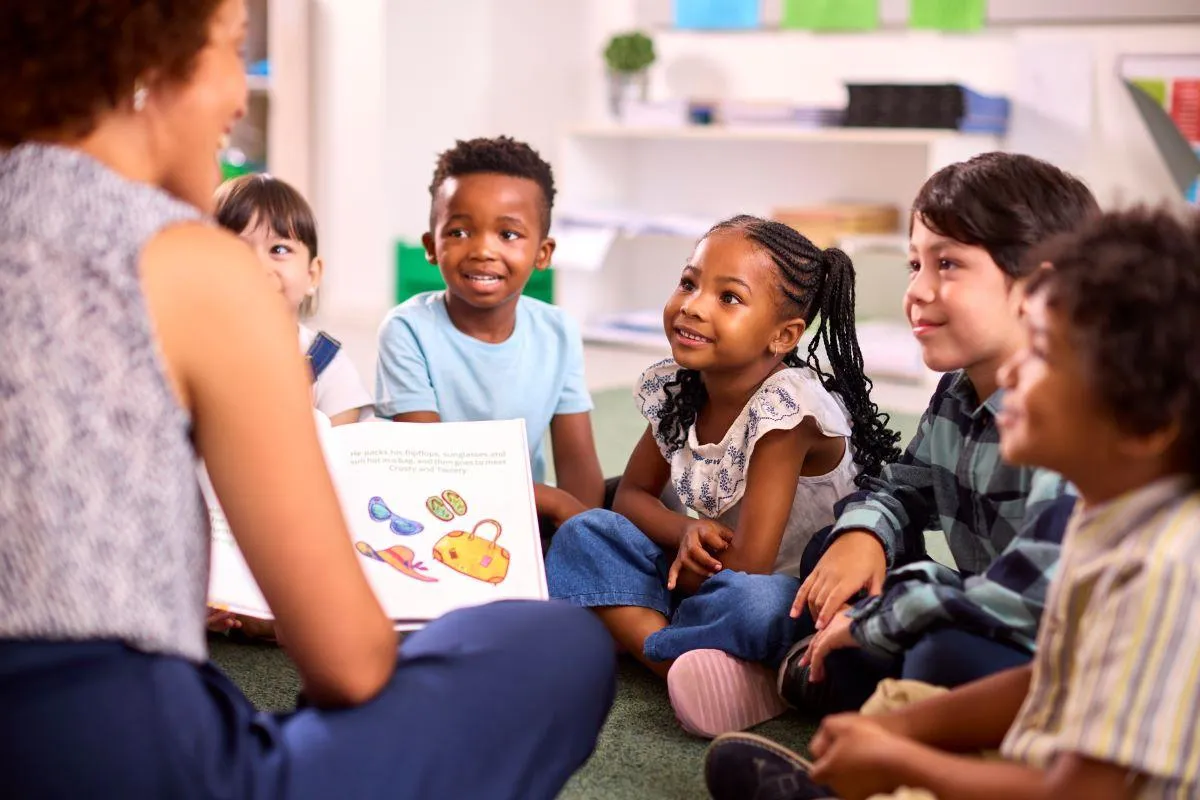Blogs and Articles
Welcome to the Sugar n Spice Daycare Center and Kindergarten blog! This is a place where parents can find helpful tips and advice on a variety of parenting topics, including early childhood development, child behavior, and parenting hacks. We also share articles about our daycare program and the events and activities that we offer.
Whether you're a new parent or a seasoned pro, we hope you'll find something useful on our blog. Please feel free to leave comments and share your own parenting tips with us. We're always learning new things, and we love hearing from our readers.

How Storytelling Nurtures Your Child's Growth
Storytelling is not just a bedtime tradition; it's a powerful tool that shapes your child's mind in countless ways. From enhancing creativity to boosting language skills, storytelling captivates children's imaginations, fostering empathy, problem-solving, and critical thinking. Through simple tales, children learn about morals, cultures, and emotions, laying the foundation for a broad understanding of the world.
Why Storytelling Matters
The importance of storytelling extends far beyond mere entertainment; it is a fundamental element of human communication and growth. For preschoolers, stories serve as a first window to the vast world around them. They learn to visualize scenarios beyond their immediate surroundings, which is important for cognitive development.
Storytelling, for preschoolers, lays the groundwork for literacy because it introduces new vocabulary and complex sentence structures engagingly. Additionally, narratives often contain lessons and morals that help young listeners discern right from wrong in a context that is easier to understand than direct instruction.
Storytelling is a multifaceted tool for teaching, where each narrative enriches a child's understanding and feeds their natural curiosity about life.
Storytelling: An Old Tradition for Modern Times
While storytelling is an ancient practice, its relevance in today's fast-paced world cannot be overstated. In an age where screens often dominate learning and play, storytelling remains a personal, interactive method of education and connection. It fosters a sense of tradition and cultural identity, connecting children to their heritage and others' cultures.
This age-old tradition also adapts well to modern educational settings, providing a versatile approach to teaching through storytelling. It allows educators to introduce complex concepts in a format that is accessible and memorable for young minds.
Even with new media, the essence of storytelling – conveying messages through narrative – continues to be a powerful educational force, proving that some aspects of human development remain constant, despite the changing times.

Psychological Benefits of Storytelling for Kids
Boosting Imagination and Creativity
Storytelling stimulates a child's imagination. When children listen to stories, they paint mental pictures that bring words to life, exercising their creative muscles. This visualization process lays the foundation for inventive thinking and creativity.
Also, storytelling encourages children to dream up their own stories, encouraging original thought and an innovative spirit. By engaging with stories, children explore endless possibilities, which boosts their creativity and ability to think outside the box.
Enhancing Emotional Intelligence
Storytelling significantly contributes to the development of emotional intelligence in children. Through stories, they encounter a variety of characters experiencing different emotions and situations, which they learn to understand and empathize with.
This understanding is pivotal for children as they learn to recognize and deal with their own emotions as well. When a story presents a character feeling sadness or joy, children connect these emotions to real-life scenarios, which enhances their ability to comprehend and express their feelings.
Fostering Empathy and Compassion
Empathy and compassion are cornerstones of emotional development, and storytelling is a key way to cultivate these qualities in children. When children are immersed in a story, they step into the shoes of different characters, experiencing a range of circumstances and challenges. This process helps them to understand and feel for others who are different from themselves.
It's this very act of imagining oneself in another's place that builds a child's capacity for empathy. So, when stories illustrate acts of kindness and the positive outcomes of compassion, they reinforce these behaviors in young listeners.
Promoting Self-Expression and Confidence
Storytelling is a powerful medium that not only entertains but also encourages children to express themselves. When children relate to characters and their journeys, they often find the words to articulate their own experiences and emotions. This self-expression is critical for their emotional health and development.
Additionally, storytelling offers a safe space where children can explore different roles and outcomes, leading to greater self-awareness and confidence. As they recount stories or share their interpretations, they practice communication skills and become more confident in their ability to convey ideas and emotions.
Educational Advantages of Storytelling
Language Skills and Vocabulary
Storytelling is a great tool for expanding a child's language skills and vocabulary. As children listen to stories, they are exposed to words and phrases they may not encounter in everyday conversation. This exposure is essential for developing a robust vocabulary, which is a key predictor of reading comprehension and overall academic success.
For preschoolers, storytelling helps them grasp the intricacies of language, such as syntax, grammar, and the rhythm of speech. Hearing new words in context also allows children to use them correctly.
Active Listening
Active listening is important for learning and social interaction, and storytelling naturally promotes this behavior in children. When a story is told, children's attention is captured, and they tune in to follow the narrative. This focused listening is the foundation of active listening, where the child is not only hearing the words but also processing and understanding the content.
Storytelling sessions can be interactive, with opportunities for children to ask questions or predict outcomes, further enhancing their listening skills. These opportunities require children to pay close attention, reinforcing their ability to concentrate and absorb information.
Cognitive and Problem-Solving Skills
Storytelling is instrumental in developing children's cognitive and problem-solving skills. As children engage with a story's plot, they encounter characters facing various challenges. Observing how these characters navigate obstacles allows children to think critically about the steps taken and consider alternative solutions. This process stimulates cognitive development by encouraging children to use reasoning and logic.
By teaching through storytelling, educators can present complex problems in a narrative context, making it easier for children to analyze and solve them. These cognitive exercises prepare children for academic tasks and real-life situations where problem-solving is key.

The Role of Storytelling in Social-Emotional Learning
Emotional Intelligence
Storytelling plays an important role in enhancing children's emotional intelligence. Emotional intelligence involves the ability to identify, understand, and manage one's own emotions, as well as the emotions of others.
Through the power of storytelling, children are exposed to a range of emotional scenarios that challenge them to understand and empathize with the characters' feelings and reactions. This connection helps them recognize and articulate their own emotions, a key step in developing emotional regulation skills.
Developing Social Skills
Storytelling is a dynamic tool for fostering social skills in children. As they listen to and engage with stories, children learn about social cues, norms, and behaviors through the interactions between characters. This helps them understand the importance of communication and cooperation in social contexts.
It also provides a shared experience where children can discuss their thoughts and feelings about the story and its characters, practicing respectful listening and speaking in turn. This collaborative aspect of storytelling sessions can also encourage shy children to come forward and express themselves, boosting their social confidence.
Conclusion
The wonders of storytelling in child development are manifold and impactful. Stories are not just a source of amusement; they are a conduit for learning, a builder of empathy, and a catalyst for creativity. They have the power to enhance language skills, improve emotional intelligence, and develop social aptitudes.
Through storytelling, children gain a deeper understanding of the world and their place within it. It is an invaluable practice that supports holistic development by addressing cognitive, emotional, and social growth.
Storytelling isn’t the only activity that benefits young minds — Read our article on preschool learning activities that can shape your child’s development!
2026 © Sugar N Spice Day Care & Kindergarten, LLC, All rights reserve
Privacy Policy | Terms and Conditions
Powered by Kyrios Systems
